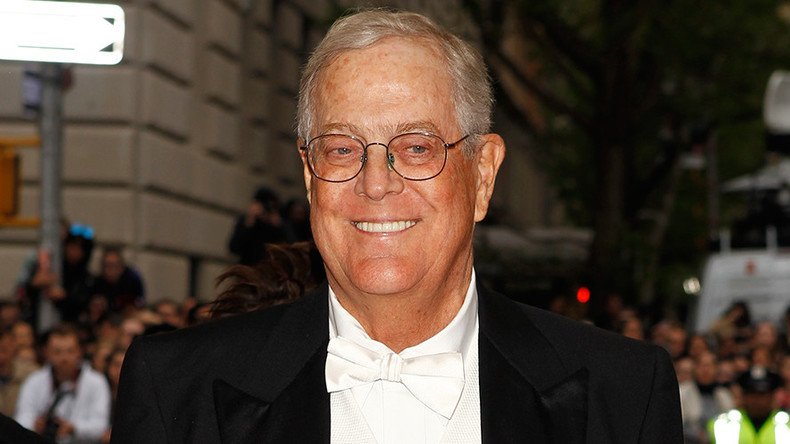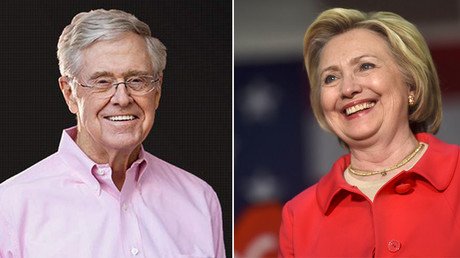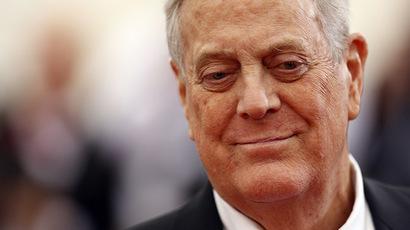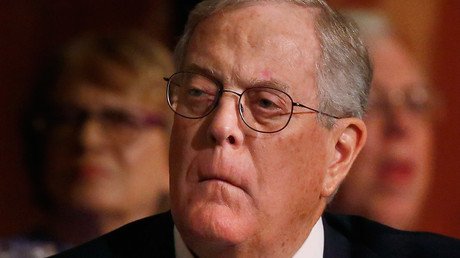Spend & deliver: Kochs pumping $42mn into defending Republicans' US Senate majority, says report

The network of donors led by billionaire oligarchs Charles and David Koch have invested $30 million of advertising for August and September, in addition to $12 million already spent, in efforts to boost five Republican Senate candidates.
The Kochs have been reluctant to fund top presidential candidates in the 2016 campaign, though Charles Koch, CEO of Koch Industries, has hinted that "it's possible" he would back Democratic frontrunner Hillary Clinton. Yet thus far, the Kochs have indicated that Clinton and likely Republican nominee Donald Trump do not align well with their brand of austerity politics.
This distaste for remaining presidential candidates has pushed the Koch network to throw its money behind Republican Senate candidates in the contested states of Florida, Nevada, Ohio, Pennsylvania, and Wisconsin, according to The Hill, all in effort to keep the US Senate in Republican control. Republicans currently hold 54 of 100 US Senate seats.
If your state has a competitive Senate race, the supposed Koch retreat isn't happening. Get ready for more Koch.https://t.co/rqJnuejs2P
— Bridge Project (@BridgeProject21) May 17, 2016
The $30 million will go towards television and cable advertising focused on policy issues dear to the Kochs during the months of August and September, The Hill reported. The Koch donor network has already spent a separate $12.4 million on US Senate races in 2016, more than any other outside conservative funding group, The Hill added.
“The network is and will continue to be fully engaged in 2016’s political and policy battles. We want to maximize the number of freedom-oriented Senators,” James Davis, spokesman for the Koch network, told The Hill.
In Ohio, the Koch network's Freedom Partners Action Fund recently spent $2.2 million on one television and digital ad campaign aimed at denigrating the positions of Democratic Senate candidate Ted Strickland, formerly the governor of Ohio. Political groups affiliated with the Kochs are spending $7.7 million overall in the Ohio Senate race, the Associated Press reported.
As head of the vast network of politically-conservative non-profits, Freedom Partners funnels millions of dollars that often pass through ‘dark money’ groups that — thanks to the 2010 US Supreme Court decision known as Citizens United — are legally allowed to raise and distribute unlimited amounts of money while withholding the identities of donors.
As of January, Koch-affiliated funding on the 2016 campaign was projected to hit nearly $1 billion, yet a lack of Koch money in the presidential race so far means that amount of spending by the industrial magnates is unlikely.
“Thus far we are not engaged in the presidential race because neither of the candidates have presented a positive vision for America, but we will look to engage in the political space around our priority issues," a Koch official told The Hill.
ICYMI: Koch Brothers to Spend Millions to Prop Up @PatToomeyhttps://t.co/Q2IkDT6Wh6
— Katie McGinty (@KatieMcGintyPA) May 17, 2016
It's #Koch money v. @russfeingold in #WI Senate https://t.co/WBnArx45rk#wiunion#kochbrothers
— Sarah Reynolds (@Sarah__Reynolds) May 6, 2016
In April, Charles Koch said that Republican presidential candidates Donald Trump and Ted Cruz were "terrible role models," and that he did not "know how we could support 'em."
"We haven't put a penny in any of these campaigns, pro or con," he told ABC News. "That's not what we do. What we're trying to do is build alliances to make the country better.”
Operations of Koch Industries, one of the largest private corporations in the US, include oil refining and distribution, manufacturing of a wide variety of consumer products, cattle ranching, and chemical production. The brothers' top political priorities rest in dismantling government regulations, especially environmental restrictions, and undoing the Affordable Care Act, known as Obamacare.















